|
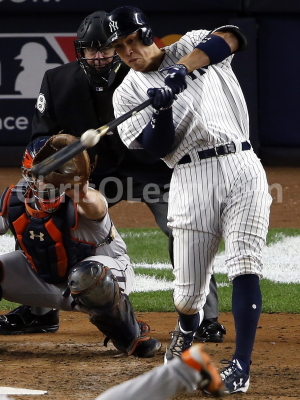 HLP
Hitting, which is short for the
High Level Pattern in Hitting,
is the latest term that is used to refer to an older observation. HLP
Hitting, which is short for the
High Level Pattern in Hitting,
is the latest term that is used to refer to an older observation.
The best baseball and fast pitch softball hitters MOVE differently than most people are
TAUGHT.
Other terms used to describe the same basic set of ideas and
movements include...
HLP Hitting
There is a difference between the High Level Pattern in
Hitting itself and the approaches that are used to try
to describe and teach the HLP. For instance, Linear Hitting, Extension Hitting, and
Rotational Hitting are
different, and competing, approaches to teaching
hitting and to describing and developing a
High Level Pattern.
Of course, and as I discuss in my piece on
The Myth of the A
to C Swing and elsewhere in my
Rethinking Hitting
essays, it is debatable whether Linear Hitting and Extension
Hitting describe the actual High-Level Swing; whether what they
teach is what the best baseball and fast-pitch softball players
actually do. Similarly, and as I discuss in
Rotational
Hitting 101, there are problems with Mike Epstein's
understanding and explanation of the High-Level Swing that
create problems with how he teaches Rotational Hitting.
As a result, when people ask me whether I teach Linear
Hitting or Rotational hitting, I say, "Neither. I teach the
High Level Pattern." That doesn't mean that I won't draw on some
concepts and drills that could be classified as Rotational
Hitting, but the ultimate goal is always to get the student
closer to the High Level Pattern.
Rotation
One point of contention, that needs to be addressed
immediately, is whether the High Level Pattern involves the Rotation
of the hips.

Josh Donaldson Demonstrating
the High Level Pattern
The answer is, "Yes."

Josh Donaldson
Demonstrating Rotation
While resisting Rotation can work as a cue for developing the
High Level Pattern...

Aaron Judge
Demonstrating Rotation
...the fact is high-level hitters DO
Rotate.
Actually.
Cues vs. Reality
If photography makes it clear that the best hitters DO Rotate --
actually -- then why do so many people insist they don't?
First, there's the difference between the Brain and the Body. The
swing happens so quickly that the (conscious) Brain may simply have
no idea what the Body is doing.
Actually.
Second, trying to resist Rotation can be helpful, especially in
terms of creating Separation and increasing the Efficiency of the
swing.
Other Problems
Most of the limitations of the existing approaches to
teaching hitting stem from a lack of a deep understanding of
what the High Level Pattern actually looks like and how it actually
works. Instead, people are just regurgitating the conventional
wisdom.
They are teaching what everybody "knows."
The problem is that most people don't know as much about
hitting and the High Level Pattern as they think they do.
As I point out in my piece on the various
Myths About
Hitting, if you spend even the briefest amount of time
comparing what people teach to what the best hitters actually
do, you will immediately see huge, and glaring, discrepancies.
What the High Level Pattern Looks Like
In an effort to explain what the High Level Pattern looks like, I have spent years accumulating a large number of
clips of the best baseball and fast-pitch softball hitters and
looking for commonalities.

Albert Pujols' Home Run Swing
Most high-level fast pitch softball players, and in
particular hitters who hit for some power, also exhibit
the same movement patterns.
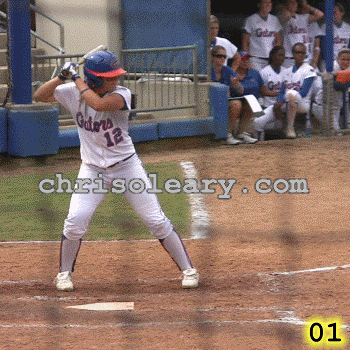
Megan Bush's Home Run Swing
While there are significant physical differences between
Albert Pujols and Megan Bush, there are few, if any,
significant differences between their swings. That is because a
high-level baseball swing and a high-level fast pitch softball
swing are the same swing.
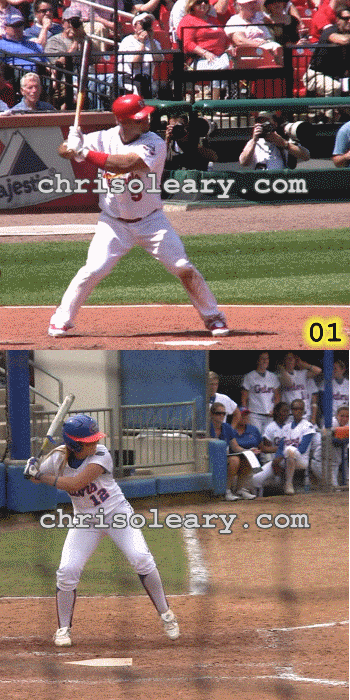
Comparison of the Swings of
Albert Pujols and Megan Bush
The thing to notice is how, while they load and get to the front
heel plant position differently, once their front heels plant
their swings are basically identical through the extension
position.
I recently obtained a clip of Evan Longoria hitting a home run
to left field that is an even better match with that Megan Bush
clip, especially at the Point Of Contact.

Comparison of the Swings of
Albert Pujols and Megan Bush
The baseball swing and the
fast pitch softball swing are the same for a very simple reason; while
men and women typically have significantly different levels of upper body strength, all able-bodied
people, regardless of their sex, have roughly proportional levels of core strength
(because it's the key to walking and running).
Because the High-Level Swing lets you tap into the large muscles
of the core, it is very efficient and as a result tends to be
the predominant swing pattern at the highest levels of both
baseball and fast pitch softball.
Exceptions to the Rule
A few high level hitters do not always use the High-Level
Swing. Ichiro
Suzuki tends to try to slap outside pitches into the ground
and beat out the throw. Yadier Molina generally looks for an
outside pitch that he can just poke into right field. Vladimir
Guerrero will swing at any pitch, regardless of its
location. However, the vast majority of major league
hitters (e.g. 95+ percent) swing in a way that is consistent
with the principles of the High-Level Swing.
Key Concepts
In order to understand the High-Level Swing, you have to
understand the concepts that serve as its foundation.
These concepts, which were first defined by Paul Nyman, include...
In order to swing with their entire body, and not just their
arms, a hitter
must start from an athletic position.
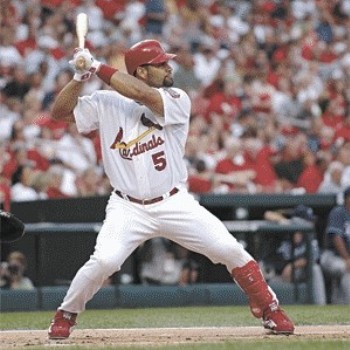
Albert Pujols at Setup
It is almost impossible to swing
with your entire body, and not just your arms, if you are standing
overly erect with your feet too close together and your knees locked.
While good hitters may talk about, and sometimes even think,
they throw or push their hands at the ball and hit the ball with
their arms extended, if you look at video clips and
still photos of the best hitters, you won't see extension at the
Point Of Contact. Instead, what you will see is that,
while their
arms do extend, they only extend after the POC. At
the POC, good hitters are usually anything but extended.
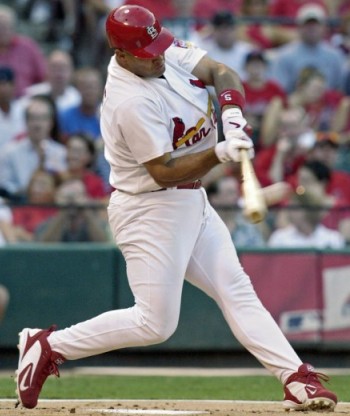
Albert Pujols at the Point Of Contact
A good swing is powered by the rotation of the hips and shoulders —
driven by the
large muscles of the core — and not by a linear, pushing movement of the
small muscles of the arms, wrists, and hands.
While the arms, wrists, and hands are important to the swing, their job
is to help funnel, direct, and manage the force that is generated
by the body rather than to create much force.
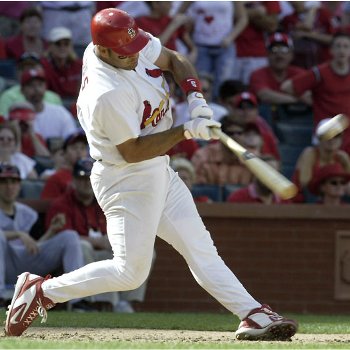
Albert Pujols Demonstrating Rotation
The photo above of Albert Pujols is a great example of what
good Rotation looks like. Notice how his hips have stopped moving
forward and have rotated 90 degrees,
due in part to the stiffening of his front leg and the extension
of his front knee. Notice
how his back knee is bent 90 degrees, which is an indication of the rapid Rotation of his
hips. Notice how the rapid rotation of his
hips has pulled him up onto the outside of his front foot.
Finally, notice how, rather than hitting off of his back foot and
squishing the bug, the rapid rotation of Albert Pujols'
hips have pulled him up onto the point of his back foot. In fact,
the rapid rotation of his hips sometimes pulls Albert Pujols' back
foot completely up in the air at the Point Of Contact.
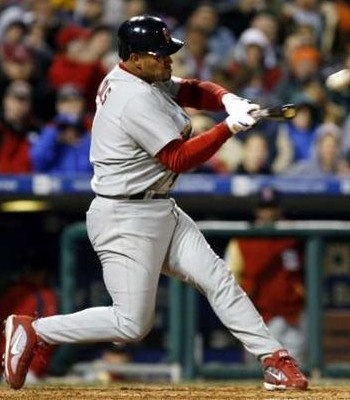
Albert Pujols Not Squishing
the Bug
Be Sure To Condition Your Core!
If you are going to dive into the High-Level Swing, then it's
important that you first make sure that your body is ready for the
transition. The High-Level Swing gets power from the muscles of the core (e.g. the Obliques) rather
than the arms. If you are going to keep from straining these
muscles, you must first make sure that they are properly
conditioned with a good core workout.
Do as he Does, not as says
Albert Pujols recently had a conversation with Harold Reynolds
about hitting. What's interesting about this conversation is
that it's good
evidence
for the gap between the conscious, thinking mind and the
subconscious, doing mind. What Albert Pujols tells you NOT to do
is what he actually does in his swing and what he tells you TO do
isn't what he actually does. Instead, it's the same older
A to C garbage that most
major league instructors preach but that no good hitters actually
do.
For More Information
To help people understand how Albert Pujols, and other major
leaguers, actually swing, I have put together a
number of free resources including a
Rotational
Hitting FAQ, an
analysis of a home run
swing of Albert Pujols, a discussion of
Albert Pujols'
stride, a page full of
photos of
Albert Pujols' swing, and a separate page that contains my
favorite examples
of swings.
Professional baseball Experience
My highest-level client is
Andres
Torres of the San Francisco Giants. Using the concepts that I
discuss on my
Rotational Hitting 101 DVD and on my client-only web site, we
worked together to revamp his swing and get him to the point where
he could be successful at the major league level.
Andres Torres isn't the only professional baseball player that I have
worked with. At last count, I have one other client in the major
leagues, three clients at AAA, one client at AA, several more
clients in the lower levels of the affiliated minor leagues, and
three clients playing for independent minor league teams and
trying to get back on the road to the major leagues. I have also
worked with a number of D-1 college baseball and fast pitch
softball players.
I don't give out the names of these players because I don't
want to get them in trouble with their coaches. While they, and I,
believe in what I teach, most of the time it contradicts what
their coaches are saying, so they have to keep it to themselves
and we have to work on the down low. If you are a minor leaguer
and are looking for help,
e-mail me and we can talk about how you can get access to my
client-only web site.
|


 HLP
Hitting, which is short for the
HLP
Hitting, which is short for the









